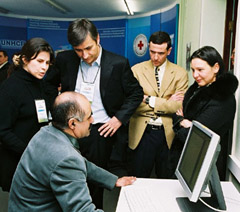ST. PETERSBURG, Russia, June 1, 2004 — Hundreds of refugees and asylum seekers here are flocking to a local community center where they can develop IT skills and obtain information to help improve their lives. In April, the International Red Cross and the United Nations High Commissioner for Refugees (UNHCR), in partnership with Microsoft, opened the first Community Technology Learning Center (CTLC) focused on the special needs of refugees.
The St. Petersburg center is expected to serve an estimated 4,000 refugees from Afghanistan and Africa, along with hundreds of Russian residents with disabilities. The center offers IT skills development, hardware and software training, and other guidance to help participants learn how to use technology.

At opening of the Community Technology Learning Center: (seated) Naib Safi, head of the Union of Afghan Citizens in St. Petersburg; (standing, from left) an interpreter; Jean-Philippe Courtois, CEO, Microsoft Europe, Middle East and Africa (EMEA); Raphael Cozijns, former Microsoft employee; Elena Bonfiglioli, Director of Community Affairs, Microsoft EMEA. St. Petersburg, April 2004.
Support for the St. Petersburg center comes from Microsoft Unlimited Potential, a worldwide initiative designed to aid global work-force development by providing technology-skills training through Community Technology Learning Centers. The St. Petersburg center is one of more than 300 such facilities across Europe, the Middle East, and Africa that are supported by Microsoft.
“Access to education is critical in helping underserved individuals and communities participate fully in society and realize their goals,” says Teresa Davis, regional Community Affairs lead for Microsoft’s Eastern European headquarters. “The CTLC supports the efforts carried out by local authorities, immigration services, and the [St. Petersburg] Labor and Social Security Committee, all of whom encouraged the initiative to promote digital inclusion, tolerance, and human-rights themes.”
The St. Petersburg Community Technology Learning Center is located east of the city in the Vasilievskiy Ostrov area. Microsoft’s contribution to the center includes a donation to the International Red Cross through the United Nations refugee agency of US$70,500 (57,700) in cash and software. The grant covers the costs of facility renovation, equipment, IT library and learning materials, Internet access, and administration for one year. The grant has helped equip the center with 11 personal computers, a server, printers, webcams, a scanner, a copier, a digital camera, and software.
The grant also will help support the technology center staff, which consists of local residents trained by one of Microsoft’s certified-technology-education partners in St. Petersburg. Staff members will teach basic and advanced IT skills to adults and children, support self-study tools provided by the center, and offer guidance on Internet use. For many of the refugees who use the center, the Internet is the only way available to them to keep in touch with relatives and receive news from their native countries. The staff also will help refugees utilize the PCs to perform critical tasks such as preparing documents for immigration services.
The CTLC’s first students were a group of 20 adults, half Afghanis, the other 10 from Africa. They recently completed a beginning technology-skills course. A second set of courses is under way, including classes dedicated to the needs of Afghani women and children.
“The participation of refugees and individuals with disabilities in programs provided by this CTLC will help facilitate their integration into their local communities,” says Anastasiya Shkinina, manager of Community Affairs for Microsoft Russia. “At the same time, this will help increase awareness among local authorities and the general public about the challenges these groups face in their everyday lives.
“People do not choose to become refugees or disabled, it just happens, and they are not to be treated in a different way or isolated,” Shkinina says. “This understanding is essential for building acceptance and awareness in Russian society.”
Microsoft’s involvement with the United Nations High Commissioner for Refugees began in 1999 during the crisis in Kosovo, when 100 Microsoft employees volunteered to help develop a portable refugee-registration system to register and provide placement-identification papers for more than 500,000 refugees.
In 2003, UNHCR and Microsoft signed a new partnership agreement that included the joint development of pilot learning centers in refugee camps, the first of which is the St. Petersburg center. The next CTLC to be established in partnership with UNHCR will be in Dadaab, Kenya, to provide support and training to more than 100,000 Somali refugees. For more information on the Unlimited Potential program, visit http://www.microsoft.com/mscorp/citizenship/giving/ .




